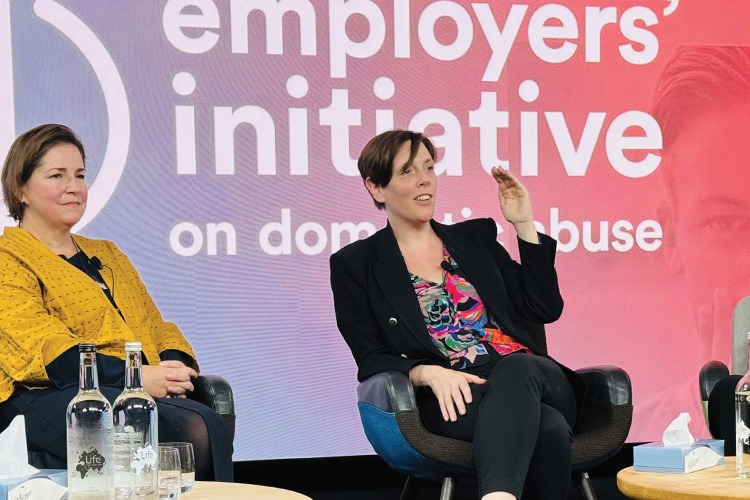EIDA Conference 2024: Joining forces to tackle Domestic Abuse
The Employers’ Initiative on Domestic Abuse (EIDA) held its flagship Conference on 16 October 2024, at Google’s offices near King’s Cross in London. The event was themed “Joining forces to tackle domestic abuse: How can employers help create societal change?”
EIDA brought together 240 engaged participants from business, government, academia, and the third sector to explore the crucial role employers can play in addressing domestic abuse.
Key Speakers and Insights
The conference opened with a fireside chat featuring Safeguarding Minister, Jess Phillips MP, and Domestic Abuse Commissioner for England and Wales, Nicole Jacobs, facilitated by EIDA Chair, Sarah Newton.
Jess Phillips MP emphasised the government’s ambitious pledge to halve violence against women and girls in the coming decade. She urged employers to take bold action, stating, “Employers play a crucial role, which is why it is so important that workplaces develop robust policies, provide training for managers, and share best practice to ensure all employees feel supported and empowered.”
Nicole Jacobs highlighted EIDA’s work in helping employers take effective action on domestic abuse. She noted, “The moment you get started, you will see how important the work is. I can’t think of any other project where the employee response has been so positive. It’s just about getting started, and I am so supportive of EIDA because they make it easy for employers to implement a response.”
The conference featured a highly experienced set of speakers who provided advice and guidance. Here are some highlights:
Cordi O’Hara OBE FEI, President, UK Electricity Distribution, National Grid, underlined how pervasive domestic abuse is: “I started thinking about how the people I sat next to at work could be going through it. It’s called ‘domestic’ abuse, but it has a huge spillover into work, through stalking, intrusive calls or emails. You don’t need to buy into a domestic abuse response personally to see the very clear business case.”
Caroline Dunne, Chief People Officer at Rothesay, emphasised the need to empower survivors: “Be led by the victim-survivor, they are the only person who knows how to manage this situation with your support and signposting to services.”
Sharon Baker, Chief Inspector at Avon and Somerset Police and survivor of domestic abuse, spoke about the need to develop a supportive workplace culture: “Spell out behaviours that all employees need to demonstrate to create a supportive culture. Have it designed by and for survivors, putting them at the heart of the systemic change.”
Patrick Ryan, CEO of Hestia: “We should have conversations on domestic abuse in our workplaces loudly and often.”
EIDA Ambassador and survivor of domestic abuse, Andrew Lane, shared his personal experience navigating the Family Court system: “Supporting an employee and crucially their children through this time is absolutely vital and makes a huge difference.”
Jo Todd CBE, CEO of Respect UK, reminded delegates that perpetrators can be found in all walks of life and encouraged employers to believe survivors and be prepared for difficult conversations: “Every type of person you can think of can be a perpetrator. They are diverse, and hiding in plain sight. They are charming and likeable. One in twelve men in the UK is a perpetrator of domestic abuse according to the latest police data. That is a large amount of your workforce causing harm at home”.
Jo Broadbent, Counsel Knowledge Lawyer at Hogan Lovells, recommended addressing perpetrators in related HR policies: “They must be fit for purpose. Disciplinary action can be taken based on behaviours outside the workplace. Make sure your HR employees are drilled in the initial response if someone is reported. The duty of care to the victim-survivor should guide your response.”
Acknowledgments and Partnerships
Special thanks were extended to the event partners – Google, Hestia Charity, and the Vodafone Foundation – for their unwavering support and the 20+ volunteers, Trustees, and Ambassadors who helped the small EIDA team of four run the event and capture learnings for all 1,700 EIDA employer members.
Call to Action: How employers can help
As the conference concluded, employers were encouraged to take concrete steps to address domestic abuse within their organisations:
- Develop a domestic abuse policy.
- Measure its impact.
- Inspire others to do the same
EIDA CEO, Susan Bright, concluded: “EIDA’s vision is for every UK employer to take effective action on domestic abuse, leading to a society where survivors thrive, and where domestic abuse is not tolerated. By joining forces and working together, we can make it happen.”
Employers interested in joining EIDA can sign up for free membership at www.eida.org.uk
Members gain access to comprehensive resources, including a step-by-step employer Handbook, guidance on handling perpetrators, taking disclosures, supporting victim-survivors, case studies, and communication tools.
Andrea Berkoff
Editor


